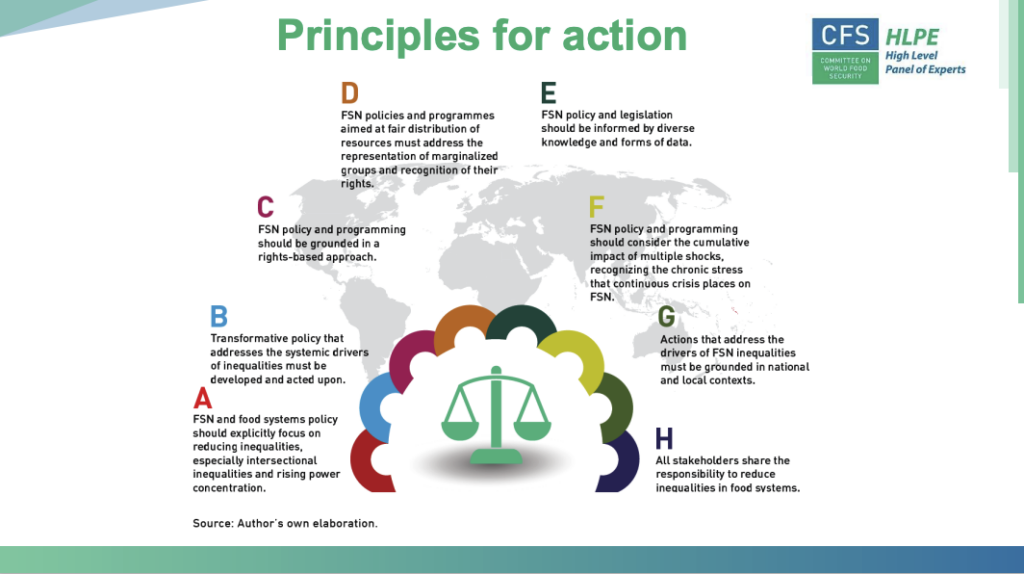Within the complex challenge of global food security and nutrition, pervasive inequalities persist. Access to sufficient, safe, and nutritious food is hindered by factors spanning economics, gender, ethnicity, geography, and socio-economic status. Recognising the multifaceted nature of these issues is vital. Considering the interplay of social identities such as gender and ethnicity, an intersectional perspective becomes imperative for effective solutions. By utilising an intersectional lens, we can address the root causes of food insecurity and malnutrition and work towards fostering a more equitable and sustainable global food system. This approach not only ensures that no one is left behind but also contributes to building resilient and thriving communities worldwide.
During the CFS 51st Plenary, Bhavani Shankar, the HLPE-FSN drafting team leader and professor in Food and Health at the University of Sheffield, presented the HLPE-FSN 18th report entitled “Reducing inequalities for food security and nutrition”, with a special emphasis on the practical recommendations that emerged from the report. The report examines the various forms of inequality in the food system, from top to bottom. It highlights how these inequalities lead to food insecurity and malnutrition, and how they are rooted in the structure and system of the food industry.
This report examines the underlying factors contributing to inequalities in food security and nutrition outcomes. It explores the structural and systemic drivers such as political decisions, conflicts, and climate change that have a deep impact on these outcomes. The report’s conceptual framework focuses on improving food security and nutrition outcomes for all by addressing inequalities both within and outside the food system.
The report acknowledges the key pillars of food security and nutrition, including agency and sustainability, which are often overlooked but remain crucial to the definition of food security. The addition of agency is particularly crucial in addressing inequalities. It empowers individuals and groups to make decisions about the food they produce, eat, or distribute and allows them to engage in processes that govern and shape food system policies. For all to have access to proper nutrition, it is essential to recognise, represent, and support those who are most vulnerable and affected by inequalities.
Improving food security and nutrition outcomes for everyone requires addressing all inequalities in food systems. Within the food system, this includes issues such as land distribution, access to forests and fisheries, power asymmetries between large and small-scale producers, participation in the value chain, consumer interactions with markets, and international trade. However, many inequalities outside the immediate food system also significantly impact food security and nutrition outcomes such as healthcare, services, immunisation, and rural livelihoods. Hence, the report emphasises the interconnectedness between external and internal inequalities and stresses that addressing external inequalities is crucial to improving food security and nutrition outcomes.
Achieving equity in the food system requires a process of recognition, representation and redistribution, which seeks to address various social and political disadvantages that contribute to food security and nutrition inequalities. This process (engine of equity) is crucial in securing better nutrition outcomes for everyone and ensuring food security and nutrition outcomes for all.
The report highlights the presence of systemic drivers of inequity that require attention. These drivers include political aspects, climate change, conflict and other underlying factors that perpetuate inequalities and propagate them into the future. The report emphasises addressing the entire system rather than resorting to superficial solutions. An intersectional and intergenerational interterritorial approach is recommended to tackle the issue effectively. Additionally, the report underscores the importance of keeping sight of human rights.
Transformational actions
Bhavani Shankar introduced a set of principles that are critical to keep in mind while designing any policy or programme in food security, nutrition and food systems.
The report suggests that food security and nutrition policies should focus on reducing inequality, and stresses the importance of embedding equity in policies and programmes, instead of following business as usual. While incremental changes are important, thinking of more transformational aspects that address the deep-rooted issues is also necessary.
Food security and nutrition policies and programmes must be based on a human rights approach. The right to food and other human rights principles that are integral to the CFS’s mission should always be considered.

